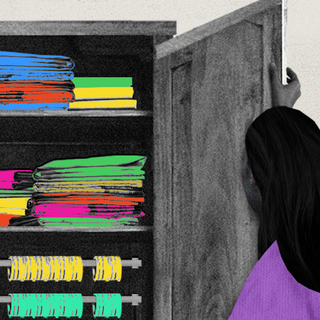
Woe Is Me! “Confrontation Makes Me Anxious. How Do I Deal?”
A series in which The Swaddle team indulges your pity party with advice you’ll probably ignore.

Woe Is Me! is a series in which The Swaddle team indulges your pity party with advice you’ll probably ignore.
“I’m usually perfectly capable of holding my own — until there’s any sign of confrontation. If I sense anger or frustration in another person’s words, a jolt of anxiety courses through me, and my heart sinks. I start apologizing profusely while feeling guilty for not knowing better. I also keep thinking about it over and over — wondering if I should’ve realized the other person might be busy, or if I should’ve known the other person’s mental state. Maybe, this stems from the sporadic fights my parents have. Every time there is peace in the house, and suddenly their voices get loud, it triggers my anxiety. I’m 26 and I keep thinking whether I’m being childish. Should I be able to keep it together?”
— Away from the battlefield
RN: Wow, are you me? This reads like something I sent in my sleep in a subconscious anxiety-ridden fugue state. Luckily after some therapy, I’ve come to value my own feelings and emotions more over time — which is to say that when there is a confrontation and someone else expresses their frustration, anger, or any negativity, I try my best to pause and see how I feel about it rather than prioritizing their feelings over mine. If there is something in you that’s telling you they’re being unfair, or that there’s more that you have to say to them than what your conflict-avoidance is allowing, sit with that and eventually, slowly, start expressing it. It boils down to the fact that your emotions and feelings are just as important as the other person’s — and they will most likely pay attention if you start letting them out! There are a lot of things you might feel like you should have known, but instead of trying to know somebody else’s mind, start with knowing your own. What is your mental state? Are you busy?
Yes, your parents fighting may have something to do with it for sure. But I’m happy to inform you that it is possible to break the cycle slowly. It’s not easy to center yourself in situations where you’ve been conditioned to pacify and retreat from an early age. But it’s possible, and now is the right time because it’s clearly making you miserable. Your mind is telling you as much, because otherwise, you wouldn’t be writing this woe to us. One more thing: asserting your feelings may feel like you are the one being confrontational at first, but try to learn the difference between asserting your needs and fighting with someone else while suppressing theirs. Asserting yourself is an extremely integral part of your identity; never feel like you don’t have a right to do so!
DR: I think the fact that you’ve been able to identify your fear of confrontation, and begun hypothesizing what it might be stemming from, is a grown-up thing to do. Look, we’ve all been shaped by our experiences — positive and negative alike — and continue to reflect that mold through our behaviors, our anxieties, and our triggers, among other things. Is it possible to break out of that mold? Sure. How much success we achieve there, though, and how soon too, don’t determine whether or not we’re behaving like grown-ups. But taking cognizance of that mold, as you have, shows you’re being responsible and mature — both very conventional signs of growing up.
Also, there’s nothing childish about your fear of confrontation. What would prima facie be a lot more childish, perhaps, is pursuing confrontations. So, with respect to your concern about that, I think you needn’t worry. About your fear of confrontation, though, yes, there’s a cause for worry — especially since it can prevent you from standing up for yourself, and worse still, lead you to situations you don’t want to be in just because you were overwhelmed by the prospect of displeasing someone. This is not to say your anxieties are invalid; instead, what I’m saying is that you could continue your endeavor to understand the underlying factors behind them so you can work towards reducing your anxiety in that regard. Besides introspection, you can consider therapy as an option too, if you feel the guidance could help.
PB: Don’t put so much pressure on yourself. Confrontation is difficult — and when you have memories of your parents fighting and shouting all the time, you try to minimize confrontation as much as possible. With confrontation, there’s always a chance of it snowballing into something worse, and you always live with the fear of hearing fromyour parents again.
I completely understand. What most people do not realize is that it’s not the confrontation we’re afraid of — it’s the fallout. Even if we know the other person is logical, and reasonably loved — we’ve seen too many people lose it over the smallest confrontation. Better to not give them that chance.
You’re not childish; you’re just human and traumatized. But you can heal — through therapy, introspection, and the usual things people suggest. I have no answers for you, but perhaps this might give you some perspective. It’s okay, and hopefully, someday you won’t be stronger or weaker, you’ll just know yourself better — and that will help you more than anything else. Have some chai, with lots of ginger.
SK: You’re not being childish at all; the fact that you recognize your behavior and even want to work on it is commendable. I’ve felt the same gnawing anxiety so many times before approaching a tricky topic with a friend, and at least in my experience, I could attribute my anxiety to two reasons. One, watching fights and conflicts play out at home could make anyone wary of healthy communication. Things escalate to a point that any and every form of conversation/discussion feels futile in the first place (but that’s not true). Two, this fear of “overthinking” what the other person may say or if you’re “wasting” their time largely stems from the anxiety of losing someone you love? Ah, what if you were to communicate what you truly feel, and they didn’t understand? Worse, what if they leave you? The anxiety of confrontation is so deeply tied to self-worth and insecurities. Sure, there’s something to be said about tactfully approaching disagreements in relationships; but if you always find yourself walking on eggshells around the other person, you’re doing a disservice to them and yourself by not asserting yourself.
Picture this: if it’s something really small — like something they said absent-mindedly, you keep it in, and nothing changes. The next time something similar happens, your response and anxiety and grudge will be much more fierce. When in fact two people should address the anger/frustration/disagreement in any friendship together. Holding it all in is more detrimental to the relationship in the long run. Push yourself to address those situations as and when they happen so that they don’t pile up later. You’re not an endless well; it will come out one day, a pile of chaos and feelings and grudges that will feel impossible to tackle.
Related


The Buzz Cut: Couple Tries Ayurvedic Cleanse for Fertility, Achieves Final Form Within White Celeb Culture
